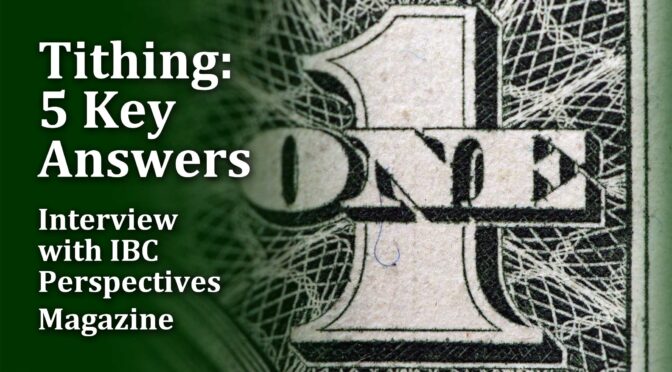Read more helpful content at IBC Perspectives Magazine.
IBC: Why is it so important for Apostolic Christians to tithe?
DJ: The Bible is clear that believers are to dedicate every aspect of their lives to the Lord. Dedicating all except the financial aspect is not all; it’s excluding something. While Christians disagree on what submission in this aspect may look like, the most common error by those who are against tithing is to mistake New Testament passages about “Emergency Relief Effort” type giving as supposedly being how all giving should be done by Christians, yet that type of giving is but one layer in a biblically modeled approach. One cannot ignore tithing and have a truly complete biblically modeled approach.
IBC: What happens if a Christian fails to tithe? Are they lost?
DJ: To presume to declare all such people as either saved or lost is to place oneself in the Lord’s place as judge. We can envision situations in which a believer knows better and willfully disobeys, and in which they don’t know better and are not willfully disobeying. The default position of fallen humanity is lost and cursed. If a believer is himself redeemed, yet he allows an existing curse to abide on his personal finances, might God allow that level of granularity? Save their soul even while their financial life is still cursed? He may well allow it in some and disallow it in others. He’s the Lord who knows the heart and judges rightly.
IBC: Should we tithe on our gross income or net income? Why?
DJ: The biblical answer, which is that tithing is to give 1/10 of all my “increase,” leads to a lot of sticky questions that various believers approach differently. In addition to gross v. net, what about inheritances, insurance settlements, birthday and anniversary gifts, or a litany of other windfalls? Consider Luke 6:38. Generally, the more I include as realized increase, the more room I grant in the “bucket” that God uses when causing future increase to come. Based on Romans 14, I grant fellow believers liberty in how they decide such matters, but I personally tithe on my gross. God has blessed us for it. In our assembly, saints tithe on their home garden’s produce. Our family enjoys every bite. Bottom line: tithing is to be based on all “increase.”
IBC: Offerings are given in addition to the tithe. What should a faithful Christian consider giving for offerings?
DJ: Since the needs vary, the amount or percentage could also vary. The New Testament indicates saints were called upon for longterm sacrificial giving due to needs as a result of emergencies, such as fellow believers starving in another region due to famine. Yet how much is too much? Each believer is free to make up their own mind on their gift (2 Corinthians 9:7). Both willingness and abundance are prerequisites for acceptance of offerings (2 Corinthians 8:12). One should avoid going into debt to give to other believers’ needs. A believer should not reduce himself to being in need while trying to meet another believer’s need.
IBC: How has tithing blessed you?
DJ: From my youth up I have always been as faithful as possible regarding tithing. God has honored His promise and has blessed me and my family abundantly. I am a genuine “testimonial” advertisement for the success that comes when adhering to a biblical model from God’s word for submitting the financial aspect of my life to Him.

